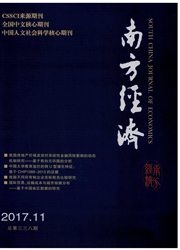

 中文摘要:
中文摘要:
基于2000—2010年中国28个省市的面板数据,测算并比较中国东部、中部及西部的全要素能源生产率;基于人力资本视角,通过差分GMM方法研究技术要素和人力资本要素对能源效率的影响效果。研究结果表明:中国全要素能源效率从东至西逐渐下降,与经济水平呈现一致分布;另外,技术进步、纯技术效率、规模效率与能源强度具有负相关性,提高技术水平可有效提高能源效率;人力资本与能源效率也存在一定关系,滞后一期受教育年限与能源强度具有负相关性。因此,可以通过提升教育水平、优化人力资本效率、发展先进节能技术来提高社会整体能源利用效率。
 英文摘要:
英文摘要:
Based on the data of twenty-eight provinces from 2000 to 2010,this paper calculated the total-factor energy efficiency of every sector,encompassing the east,the middle and the west.Besides this,based on the perspective of human capital,this paper introduces the variables of human capital,together with the technical factors,to the difference generalized moment model(diff-GMM),and studies the effects of human capital and technical factors on energy efficiency.By comparing the index of three major economic districts,we find there is a decreased tendency from the east to the west.The east has the highest total-factor energy efficiency,the middle comes second,and the west ranks third.The results also show that technical progress,pure technical efficiency,scale efficiency have a negative correlation with energy efficiency;the lagged average years of education have obvious effect on energy efficiency.Consequently,in order to improve energy efficiency,we should import advanced technology,increase the scale advantages and allocate human capital reasonably.
 同期刊论文项目
同期刊论文项目
 同项目期刊论文
同项目期刊论文
 期刊信息
期刊信息
